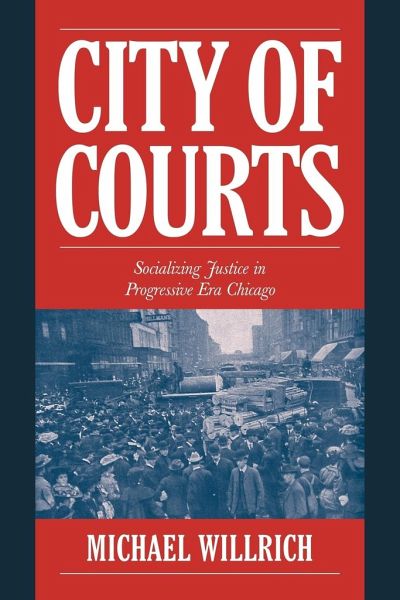
City of Courts
Socializing Justice in Progressive Era Chicago
Herausgeber: Tomlins, Christopher

PAYBACK Punkte
18 °P sammeln!
Short description/annotationContesting concepts of crime, and social justice in nineteenth-century industrial America.Main descriptionWhat could be more 'liberal' than the modern idea of social responsibility for crime - that crime is less the product of free will than of poverty and other social forces beyond the individual's control(?)33; And what could be more 'progressive' than the belief that the law should aim for social, not merely individual, justice(?)33; In this work of social, cultural, and legal history, Michael Willrich uncovers the contested origins and paradoxical consequences o...
Short description/annotation
Contesting concepts of crime, and social justice in nineteenth-century industrial America.
Main description
What could be more 'liberal' than the modern idea of social responsibility for crime - that crime is less the product of free will than of poverty and other social forces beyond the individual's control(?)33; And what could be more 'progressive' than the belief that the law should aim for social, not merely individual, justice(?)33; In this work of social, cultural, and legal history, Michael Willrich uncovers the contested origins and paradoxical consequences of these two protean concepts in the cosmopolitan cities of industrial America at the turn of the twentieth century. In Progressive Era Chicago, social activists, judges, and working-class families seeking justice transformed criminal courts into laboratories of progressive democracy. Willrich argues that this progressive effort to 'socialize' urban justice redefined American liberalism and the rule of law, laying an urban seedbed for the modern administrative welfare state.
Table of contents:
Part I. Transformations: 1. The price of justice; 2. A managerial revolution; 3. Rethinking responsibility for a social age; 4. Socializing the law; Part II. Practices: Interlude: Socialized Law in Action; 5. 'Keep sober, work, and support his family': the court of domestic relations; 6. 'To protect her from the greed as well as the passions of man': the morals court; 7. 'Upon the threshold of manhood': the boys' court; 8. 'Keep the life stream pure': the psychopathic laboratory; Part III. Misgivings: 9. America's first war on crime; Afterword.
Contesting concepts of crime, and social justice in nineteenth-century industrial America.
Main description
What could be more 'liberal' than the modern idea of social responsibility for crime - that crime is less the product of free will than of poverty and other social forces beyond the individual's control(?)33; And what could be more 'progressive' than the belief that the law should aim for social, not merely individual, justice(?)33; In this work of social, cultural, and legal history, Michael Willrich uncovers the contested origins and paradoxical consequences of these two protean concepts in the cosmopolitan cities of industrial America at the turn of the twentieth century. In Progressive Era Chicago, social activists, judges, and working-class families seeking justice transformed criminal courts into laboratories of progressive democracy. Willrich argues that this progressive effort to 'socialize' urban justice redefined American liberalism and the rule of law, laying an urban seedbed for the modern administrative welfare state.
Table of contents:
Part I. Transformations: 1. The price of justice; 2. A managerial revolution; 3. Rethinking responsibility for a social age; 4. Socializing the law; Part II. Practices: Interlude: Socialized Law in Action; 5. 'Keep sober, work, and support his family': the court of domestic relations; 6. 'To protect her from the greed as well as the passions of man': the morals court; 7. 'Upon the threshold of manhood': the boys' court; 8. 'Keep the life stream pure': the psychopathic laboratory; Part III. Misgivings: 9. America's first war on crime; Afterword.




